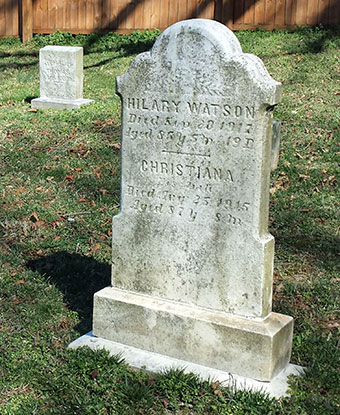Last updated: June 22, 2021
Person
Hilary and Christina Watson

NPS
Born into slavery, Hilary and Christina Watson became landowners and prominent members of the African American community in Sharpsburg, Maryland during the era of Reconstruction following the Civil War. Christina was born in 1826 in what later became West Virginia, while Hilary was born in Maryland in 1832. When Hilary was less than a year old, John Otto purchased him and his mother to work on Otto’s sixty-acre farm near Sharpsburg. As Hilary Watson grew older, John Otto, unlike most slaveowners, paid Watson for his work during the harvest. Otto also allowed Watson to keep money that he earned from working for other whites. It is not known how Hilary and Christina met, but they married in 1856 while both were enslaved.
During the Battle of Antietam on September 17, 1862, Hilary Watson was living on the Otto farm, and Christina Watson was working in Sharpsburg. Although the Otto family fled the day before the battle, Hilary Watson remained on the farm. Soldiers from both sides took food, firewood, and animal feed. After a few close calls with exploding shells, Watson finally fled the battlefield. When he returned, he found dead and wounded soldiers along the roadside, in the barn, in the house, and in the fields.
The Watsons became free in 1864, when Maryland abolished slavery. Hilary Watson continued to work on the Otto farm as a hired laborer. The Union Army soon drafted Watson, but John Otto paid $300 to keep him on the farm and out of the war. For Hilary and Christina Watson, emancipation meant that they were finally free to live together, probably for the first time in their eight years of marriage. In 1870, they lived in a rented house in the countryside near Sharpsburg. A few years later, they bought a lot on East High Street near Tolson’s Chapel and constructed a log house.
The Watsons worked to build and sustain Tolson’s Chapel, the Methodist church that was an important institution in the African American community in Sharpsburg. They likely joined Tolson’s Chapel when it was organized in 1865, and Hilary Watson served as a church trustee. Christina, also known as “Teany,” participated in the Sunday school and was one of a group of women who organized a festival in 1881 to raise funds for the church.
Having been denied the chance to attend school while enslaved, the Watsons helped make sure that the next generation had the opportunity to get an education. Hilary Watson was a trustee for the public school that met in Tolson’s Chapel from the early 1870s until 1899. The couple sent their daughter Ida to the school in the late 1870s and 1880s, before the law required children to attend school. In 1899, they sold land to the county for the construction of a new schoolhouse for African Americans. The Watsons’ commitment to the church and school illustrates the importance of these institutions in African American communities during Reconstruction.
In 1913, Hilary Watson was interviewed by author Clifton Johnson about his experiences during the Battle of Antietam. At that time, he and Christina were living in the house on East High Street, where Hilary worked as a broom maker. Christina Watson died in 1915, and Hilary Watson followed two years later. Both are buried in the Tolson’s Chapel Cemetery.
Other notable people connected to Tolson's Chapel include David B. Simons, and John J. Carter.
